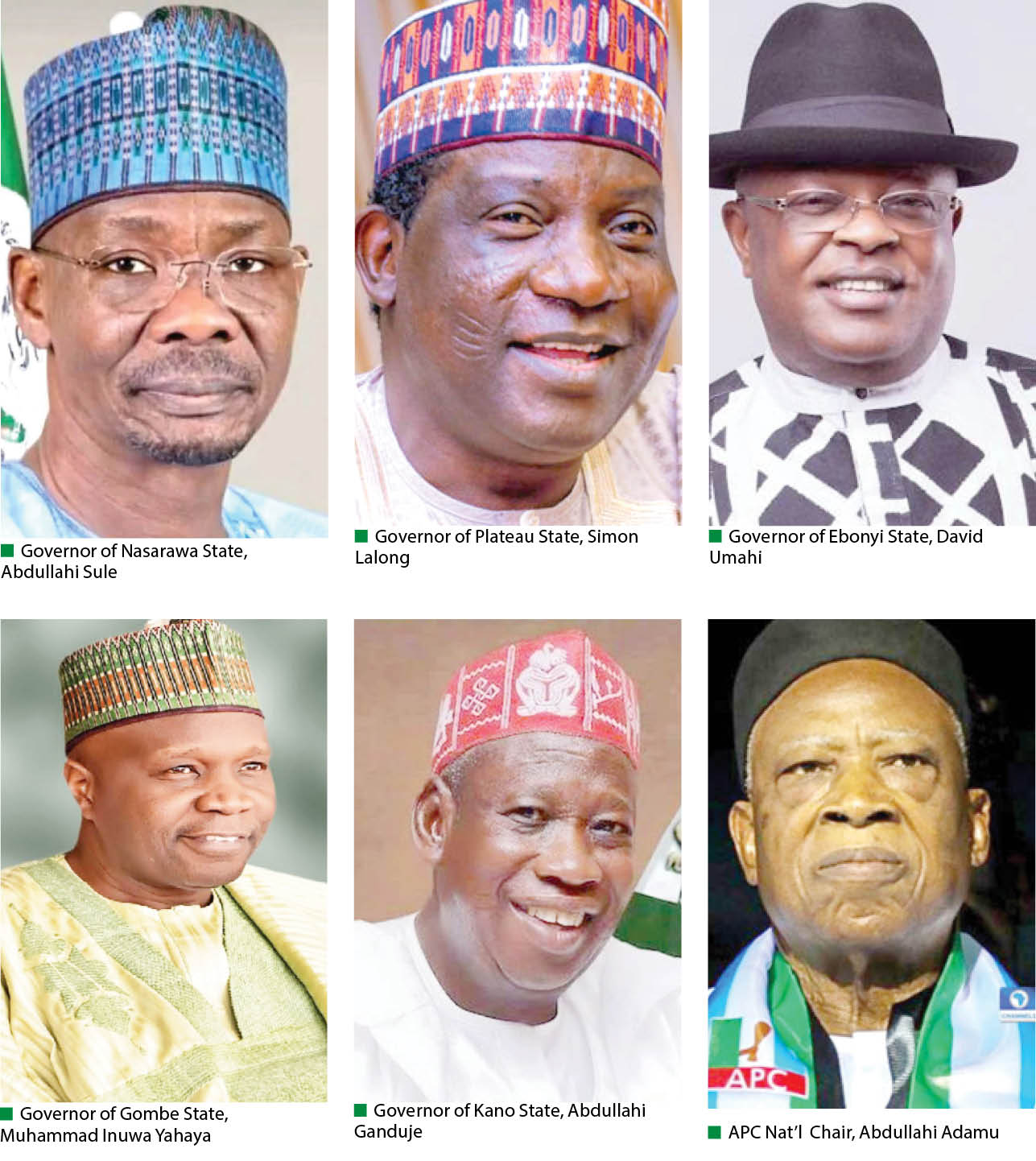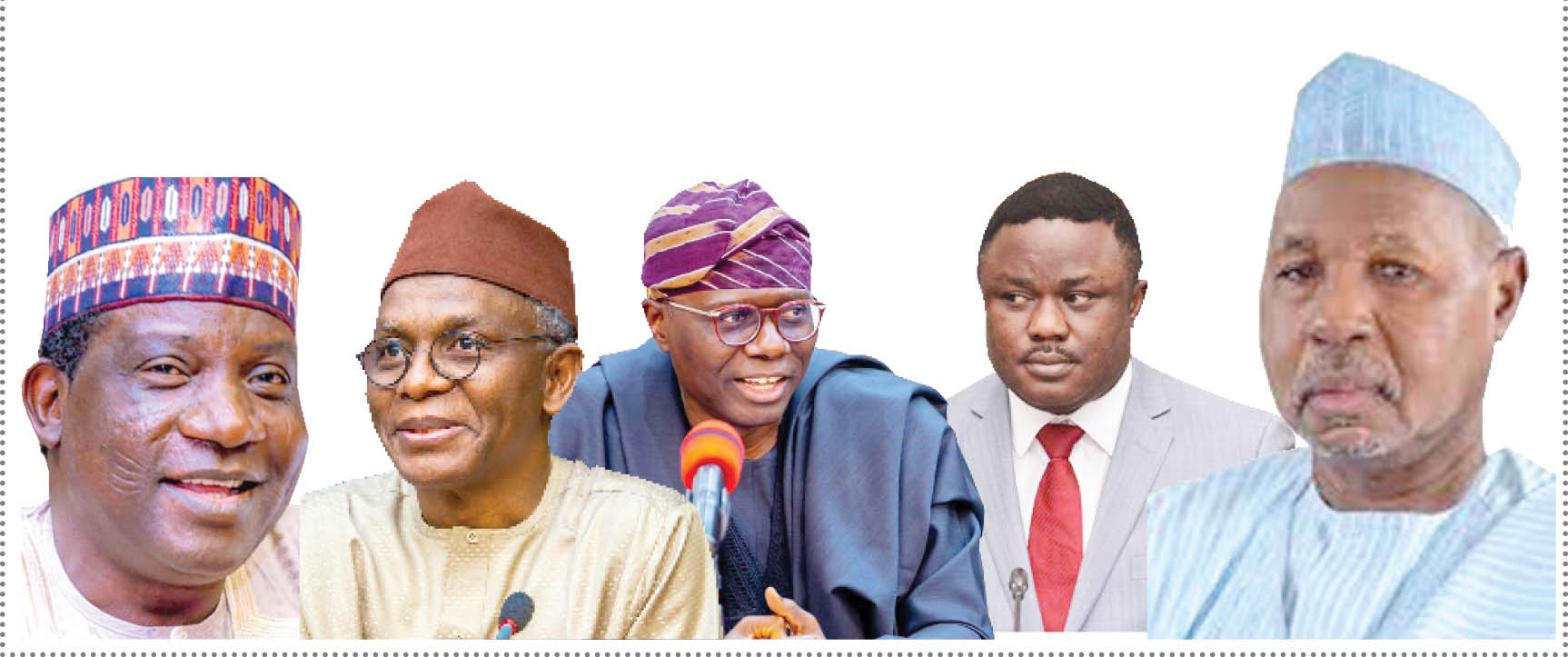By Saawua Terzungwe (Abuja), Abdullateef Aliyu (Lagos), Eyo Charles (Calabar), Tijjani Ibrahim (Katsina), Mohammed Ibrahim Yaba (Kaduna), Dickson S. Adama (Jos) & Nabob Ogbonna (Abakaliki)
The February 25, 2023, presidential and National Assembly elections presented shocking results that have made a landmark in the political history of Nigeria.
This is especially as the ruling All Progressives Congress (APC) was defeated in many states seen as its strongholds.
Going by what many pundits described as “not so impressive outing” in some of its strongholds, Daily Trust on Sunday reports that the emergence of APC’s presidential candidate, Bola Ahmed Tinubu as the overall winner of the presidential election was dogged with criticisms and litigation from the opposition, even as others believe that Asiwaju worked for his victory.
Tinubu, a former Lagos State governor, was declared the president-elect after polling 8,794,726 votes to defeat 17 other candidates.
Why I was not happy as deputy governor – Danjuma Gani
His closest rival, Atiku Abubakar of the Peoples Democratic Party (PDP), polled a total of 6,984,520 votes, while another top contender, Peter Obi of the Labour Party (LP), came third in the election with 6,101,533 votes.
Many were taken by surprise when the Independent National Electoral Commission (INEC) announced that the APC candidate was defeated in Lagos, his home state.
Not only in Lagos, the APC was equally defeated in Kaduna, Nasarawa, Yobe, Gombe, Katsina, Plateau, Imo, Ebonyi and Cross River states.
The most surprising part of it was that some of the APC governors couldn’t deliver their states to the party.
Tinubu, the national leader of the APC, couldn’t deliver Lagos and Governor Abdullahi Umar Ganduje could not deliver Kano. These are two states seen as the vote bank of the party.
Also, Governor Nasir el-Rufai couldn’t deliver Kaduna, even as President Muhammadu Buhari failed to deliver Katsina State to the party.
Similarly, the APC national chairman, Abdullahi Adamu, could not deliver his state, Nasarawa; Senate President Ahmed Lawan couldn’t deliver Yobe; the Plateau State governor, Simon Lalong, who led the APC presidential campaign team, could not deliver his state. He even lost his senatorial bid.
In the same vein, Senator Philip Aduda could not deliver the Federal Capital Territory (FCT) on the platform of the Peoples Democratic Party (PDP), while the Labour Party (LP) shattered the dreams of both the PDP and APC in the South East and South South.
The presidential candidate of the LP, Peter Obi, won in Tinubu’s Lagos, while PDP’s Atiku Abubakar won in Buhari’s Katsina.
Also, Tinubu did not win Osun, said to be his ancestral home in the South West zone. It was won by Atiku. In Kano, it was Kwankwaso who won while Obi won Abdullahi Sule’s Nasarawa.
Atiku also won in Governor Mai Mala Buni’s Yobe based on the results declared by INEC.
Daily Trust on Sunday reports that the real reasons behind these defeats vary from state to state. There is a kind of consensus that ethnic and religious motives, among other factors, were used by some candidates to sway voters’ opinions.
Internal squabble caused defeat in C/River
Sources in the APC confirmed to Daily Trust on Sunday that internal squabble was the major reason that led to the party’s defeat in Cross River State.
Recall that the party in the states was enmeshed in crisis after the primaries last year, leading to litigations. The APC failed to resolve the crisis.
Although the party’s presidential candidate, Tinubu, reportedly waded in during his town hall meeting with critical stakeholders in the state as part of his campaign activities, sources say party members were still aggrieved and not on the same page, leading to its defeat.
Our correspondent reports that some citizens in the state refused to vote for the party because of the hardship they experienced in the land, attributing it to APC’s bad governance.
Beyond APC’s trouble in the state, some party members said they strictly cast their votes for Obi because he appealed to their sentiments.

Katsina
In Katsina State, some stakeholders of the party have listed insecurity, hardship being experienced by citizens as a result of the naira redesign and swap policy of the Central Bank of Nigeria (CBN) and intra-party crisis as reasons the party was defeated.
Some of the voters who spoke with Daily Trust on Sunday in the state said although the problem of insecurity, particularly banditry, did not actually start during the APC administration in the state, it became worse under the party’s reign.
The head of the Department of Political Science, Umaru Musa Yar’adua University, Katsina, Dr Kabir Musa Yandaki, is of the opinion that two major factors contributed to the defeat of the party in the state.
He said, “As you know, Katsina is one of the states bedevilled by insecurity; it is also one of the poor states in the country. So, in this election, people expressed their dissatisfaction with the APC-led administration because of insecurity and poverty.
“Also, Katsina is like a second home to the PDP candidate, Atiku Abubakar because of his relationship with the Yar’adua family. So, many voters considered that factor, coupled with the fact that he is a northerner. These are the reasons they opted to vote for him against Tinubu,” he said.
A chieftain of the party who spoke with one of our correspondents said, “People were hopeful that the Buhari administration would end insecurity, being one of its three major campaign promises. However, while the administration was able to achieve that in the area of Boko Haram insurgency, particularly in the North East, it failed in northwestern states, including Katsina, where banditry, cattle rustling and kidnapping for ransom reared its ugly head before the APC administration and continued to grow from strength to strength.”
Similarly, a chieftain of the party in the state said the naira swap policy had in no small measure got the electorate miffed about the Buhari administration, thus they rejected the APC during the presidential poll.
Sources in the state confirmed that internal wrangling which followed the outcome of last year’s primaries that led to the defection of some aggrieved party members equally contributed to APC’s defeat at the presidential poll in the state.
Recall that some aspirants who couldn’t make it at the primaries jumped ship to other parties to satisfy their political ambitions, especially as consensus was a major issue to many.
The senator representing Katsina North, Ahmed Babba Kaita, who eventually lost his bid to return to the upper chamber, left the ruling APC even before the governorship primary and pitched tent with the major opposition PDP, where he was given a ticket.
Similarly, a few days to the elections, three serving members of the House of Representatives defected to the opposition PDP on the ground that they lost their bid to retain APC’s ticket.
Also, shortly after the governorship primaries, a major party leader, the then secretary to the state government, Dr Mustapha Inuwa, who resigned his position to contest for the governorship seat, also defected to the PDP, where he became the director-general of the Atiku/Lado campaign in the state.
Nasarawa
In Nasarawa State, key players have identified sabotage, conflicting interests and internal wrangling as major causes of APC’s defeat.
Some stakeholders of the party under the aegis of Concerned APC Stakeholders in the state have, however, asked the state governor, Abdullahi Sule, to resolve issues that led to the party’s defeat and pave the way for its victory in the March 11 governorship and state House of Assembly elections.
Addressing a press conference after the meeting yesterday in Abuja, The Rev Dominic Alancha, flanked by others said, “We lost that election because of sabotage and anti-party by some aggrieved.”
Alancha said, “The defeat of the APC in Nasarawa State was orchestrated by internal wrangling, especially from aggrieved state government functionaries. Most of them are APC government appointees who worked against the party and are planning to work against it in the governorship and state assembly elections.
“They are already converging to perfect their gang-up against the party, with a view to ridiculing the national chairman of our party and other leaders of thought.
“We, therefore, say that the governorship and House of Assembly elections slated for March 11 should be different.
“We are calling on all concerned to come out and address the issues that could hamper the victory of the APC in the March 11 election in Nasarawa State.
“We believe that Abdullahi Sule is one of the governors considered to have done well. It is pertinent that we expect the people of Nasarawa State to be circumspect on March 11.”
But beyond the APC crisis in the state, it was gathered that many Christians opted for LP’s Obi on the ground of what they described as “spirit of fairness for a Christian to take over from a Muslim president.”
Moses Buba, a resident of Lafia, the state capital, said he had no regret voting for Obi.
“Both the APC and PDP believe in power shift and we thank APC governors for insisting that power must go to the southern part of Nigeria. However, they were short of completing the ideal by keeping silent on the issue of religion, and that is how Tinubu had his way. This has angered many of us, who made up our minds to go for Obi. Tinubu went for a Muslim vice president but Obi, who is a Christian chose a Muslim from the North. That is why we voted for him,” he said.
Lagos
In Lagos, many expressed shock when INEC announced the results of the poll and Tinubu was defeated by Obi.
With the results declared by the state collation officer and vice chancellor of the Federal University of Technology, Akure, Obi polled 582,454 while Tinubu scored 572,606, with Atiku Abubakar of PDP, coming third with 75,750.
Some analysts have argued that the APC lost in the state because Obi’s supporters, popularly called ‘Obedient’ the majority who are youths, actually voted for the LP.
With a sizable population of the Igbo in Lagos and the upwardly mobile Nigerian youth, it became predictable that Tinubu and Lagos APC were headed for an unprecedented electoral misfortune.
It was also gathered that most Yoruba Christians voted for Obi instead of their kinsman, Tinubu.
The 2020 #EndSARS revolution was also a major factor in APC’s loss as many youths were yet to forgive Tinubu for the episode that climaxed with the shooting of protesters at the Lekki tollgate on October 20, 2020; although the reported shooting is being denied by authorities in the state and the federal government.
The LP chairman in Lagos, Dayo Ekong, said the margin of victory would have been higher if not for the violence and intimidation allegedly unleashed on voters in some local government areas in the state.
A political scientist, Prof Gbade Ojo, said that in addition to the #EndSARS and the expectation of the youth that Tinubu should have handled the issue far better and more humane, the eight-month strike by university teachers was another sad event that led to APC’s defeat in the state.
Kaduna
In Kaduna State, the leading opposition PDP won 14 of the 23 local government areas. The LP won 7 local government areas, all in southern part of the state, while the ruling APC won only two.
The three senatorial seats from Kaduna North (Zone 1), Kaduna Central senatorial seat (Zone 2) and the Kaduna South senatorial (Zone 3), were all won by the PDP.
Our correspondent reports that this has never happened in the political history of the state, that the majority of seats, particularly senatorial seats, were won by the opposition party.
Analysts attributed the failure of the ruling party to many policies of Governor Nasir el-Rufai.
Recall that houses and markets were demolished by the governor as a result of his urban renewal policy. When he came on board, he demolished many houses without paying adequate compensation to owners.
El-Rufai also sacked over 25,000 “unqualified” primary school teachers and recruited new ones. He also sacked hundreds of civil servants, with many yet to receive their entitlements.
More than 15 markets were also demolished in a move to modernise them without paying compensation to traders. The construction of the markets is still ongoing in different parts of the state. The increment of the Kaduna State University tuition fee is another factor that the students, parents felt upset about.
Most of the students have no choice but to drop out of the university because their parents could not afford to pay the new fee. Despite the students’ protest, the governor remained adamant on his decision.
The governor also sacked district and village heads across the 23 local government areas, which brought criticisms against the government as many people claimed the sack of the traditional leaders worsened insecurity in their communities.
A source said, “There are still people in Zaria who are not happy with the decision of the governor to crown his friend as the Emir of Zazzau, Ambassador Nuhu Ahmad Bamalli, after the demise of Emir Shehu Idris.”
The COVID-19 lockdown, which the governor enforced for months where mosques were locked down in 2020, also angered many Muslims in the state.
It was during the lockdown that the COVID-19 enforcement committee agents stormed the house of the popular Islamic scholar, Sheikh Dahiru Bauchi and evacuated his students (almajirai) for allegedly going against the COVID-19 protocols at the middle of the night.
This too didn’t go down well with his followers as they promised to revenge by voting against the APC in the state.
Like other places, religion also played a key role in Kaduna as many Christians voted for Obi instead of Tinubu, Atiku or Kwankwaso.
Governor El-Rufai had few weeks ago, during the governorship campaigns, sought for forgiveness from the residents about some of his decisions, saying he took them with good intentions, but that didn’t change the people’s mind against him in the last election.
Plateau
The APC in Plateau State also lost to the LP, sequel to what many described as lack of dividends of democracy to the people and religious persuasions.
Our correspondent reports that pundits have hinted that some APC leaders would support the PDP in the March 11 governorship and state House of Assembly elections.
Also, many believe that the major reason for the set back in the political fortune of the APC in the state was due to the internal wrangling that characterised the outcome of last year’s governorship primary poll, where Nentawe Yilwadta emerged the party’s candidate.
The aggrieved aspirants in the APC still believe that the process that produced Yilwadta was orchestrated in his favour, who they said was the governor’s candidate.
Others believe that the electorate went for Obi because he is a Christian, unlike Tinubu, Atiku and Kwankwaso, among others.
Ebonyi
Since 1999, Ebonyi has been a PDP state, except in 2020 when the incumbent governor, having won his second tenure, dumped the party to pitch tent with the ruling APC.
The APC, which came into existence after its merger in 2014, has no formidable structure, owing to the reason that those who were members were few, and as such, could not make great impact save for personal aggrandizement.
Governor Umahi defected with executive council members, 13 council chairmen and half of 24 members from the state House of Assembly.
Another reason was the emergence of the Labour Party presidential candidate, Obi, which made many voters to jump ship.
Emmanuel Agunna from Ishieke in Ebonyi Local Government Area of the state, told Daily Trust on Sunday that except for rigging, the APC wouldn’t have won any seat in last Saturday’s election.
Other factors
Pundits said that beyond the factors mentioned above, many of the APC governors did not pay attention to specific campaign tailored at selling the National Assembly candidates in their states as they were always in Abuja concentrating on national politics.
A political scientist, Mohammed Umar Mohammed, said the governors, especially those not seeking for second term, wanted to be very close to Tinubu at the centre.
“Remember that if not for the APC governors, Tinubu wouldn’t have gotten the APC ticket at the first instance.
“They put so much pressure on President Buhari, and when the contest was left open, Tinubu had his say. But unfortunately, I don’t know whether it was by accident or design, most of the APC governors, including those seeking for Senate seats, did not pay attention to troubles in their backyards, they were following Tinubu left, right and centre, and on the D-Day, many voted in anger.
“There are many lessons to learn from the presidential election. Our leaders are now fully aware that voters are no longer gullible, and this is good for our democracy. The only sad thing is that we allowed religion and tribe to influence our decisions,” Mohammed said.

 Join Daily Trust WhatsApp Community For Quick Access To News and Happenings Around You.
Join Daily Trust WhatsApp Community For Quick Access To News and Happenings Around You.


